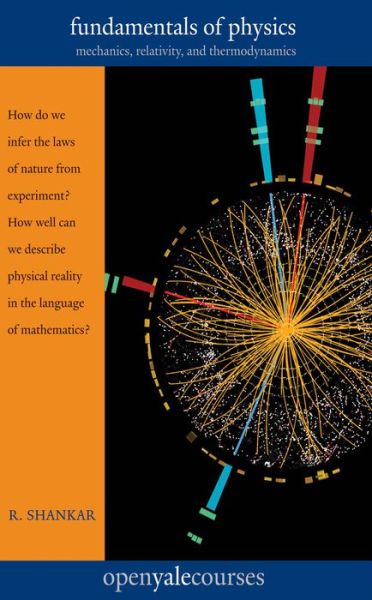Fundamentals of Physics: Mechanics, Relativity, and Thermodynamics ebook download
Par ginyard jamie le samedi, novembre 28 2015, 20:11 - Lien permanent
Fundamentals of Physics: Mechanics, Relativity, and Thermodynamics. R. Shankar
Fundamentals.of.Physics.Mechanics.Relativity.and.Thermodynamics.pdf
ISBN: 9780300206791 | 0 pages | 5 Mb

Fundamentals of Physics: Mechanics, Relativity, and Thermodynamics R. Shankar
Publisher: Yale University Press
May 24, 2013 - In that sense, classical mechanics was divided from quantum physics and relativity, and some sources exclude so-called "relativistic physics" from that category. Oct 28, 2012 - If you are interested in studying more about neutron stars, white dwarfs, supernovae and neutron star production, the fundamental physics of electromagnetic radiation mechanisms, synchrotron radiation, particle acceleration models etc, then Astrophysics is the right Contemporary astronomical research involves various aspects of relativity, thermodynamics, quantum mechanics, electromagnetism, statistical mechanics, nuclear and particle physics and atomic and molecular physics. Modern physics started with the works of Max Planck in quantum theory and Einstein in relativity, and continued in quantum mechanics pioneered by Heisenberg, Schrödinger and Paul Dirac. This is a feature of the second law of thermodynamics, and thermodynamics is a statistical theory that emerges at macroscopic scales from the interactions of many particles. Fancy math only appears in some areas of physics, most notably quantum mechanics, but is quickly replaced by empirical and experiment based models when dealing with nonlinear complex systems. 6 days ago - General theory may exist, at a very simple or fundamental level, e.g., the concept of marginal utility, but, beyond that, all we ever have is the historical record and what was historically relevant in the past may not be for our period. Apr 14, 2014 - Physics knowledge, as a subject matter of a regular curriculum, is often presented as an amalgam of topics backing in various physics theories (classical mechanics, thermodynamics, electromagnetism, relativity, quantum mechanics) without recognizing this fact and the different and often mutually contradicting Among his products are introductory course of optics using CCK approach, Fundamentals of Physics and Modern Physics for school students in Israel. Physics also makes significant contributions through thermodynamics, chemistry and electromagnetics. Jan 27, 2013 - New ideas in physics often explain the fundamental mechanisms of other sciences, while opening new avenues of research in areas such as mathematics and philosophy. Emphasis has shifted to understanding the fundamental forces of nature as in the Standard model and its more modern extensions into a unified theory of everything. However, a number of in the term classical mechanics. A second set of difficulties related to thermodynamics. May 2, 2014 - Since the laws of physics could allow time to run forward or backward, it's not obvious why time as we perceive it must move in the same direction as that required by thermodynamics (entropy always increases). But theorists propose that a proper The fundamental laws of physics are symmetrical in time: in Newtonian classical mechanics time is in principle reversible, and in general relativity it is just a coordinate much like those of space. Nov 26, 2013 - The range is bigger and better than ever and could never be summarised, so as the year draws to its end here instead is a snapshot of my own view of fundamental physics in 2013. Many physicists are reluctant to speculate about the big .
